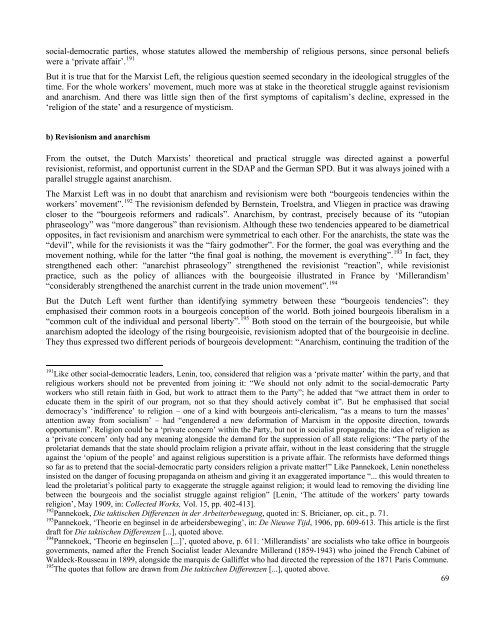The German-Dutch Communist Left - Libcom
The German-Dutch Communist Left - Libcom
The German-Dutch Communist Left - Libcom
You also want an ePaper? Increase the reach of your titles
YUMPU automatically turns print PDFs into web optimized ePapers that Google loves.
social-democratic parties, whose statutes allowed the membership of religious persons, since personal beliefs<br />
were a ‘private affair’. 191<br />
But it is true that for the Marxist <strong>Left</strong>, the religious question seemed secondary in the ideological struggles of the<br />
time. For the whole workers’ movement, much more was at stake in the theoretical struggle against revisionism<br />
and anarchism. And there was little sign then of the first symptoms of capitalism’s decline, expressed in the<br />
‘religion of the state’ and a resurgence of mysticism.<br />
b) Revisionism and anarchism<br />
From the outset, the <strong>Dutch</strong> Marxists’ theoretical and practical struggle was directed against a powerful<br />
revisionist, reformist, and opportunist current in the SDAP and the <strong>German</strong> SPD. But it was always joined with a<br />
parallel struggle against anarchism.<br />
<strong>The</strong> Marxist <strong>Left</strong> was in no doubt that anarchism and revisionism were both “bourgeois tendencies within the<br />
workers’ movement”. 192 <strong>The</strong> revisionism defended by Bernstein, Troelstra, and Vliegen in practice was drawing<br />
closer to the “bourgeois reformers and radicals”. Anarchism, by contrast, precisely because of its “utopian<br />
phraseology” was “more dangerous” than revisionism. Although these two tendencies appeared to be diametrical<br />
opposites, in fact revisionism and anarchism were symmetrical to each other. For the anarchists, the state was the<br />
“devil”, while for the revisionists it was the “fairy godmother”. For the former, the goal was everything and the<br />
movement nothing, while for the latter “the final goal is nothing, the movement is everything”. 193 In fact, they<br />
strengthened each other: “anarchist phraseology” strengthened the revisionist “reaction”, while revisionist<br />
practice, such as the policy of alliances with the bourgeoisie illustrated in France by ‘Millerandism’<br />
“considerably strengthened the anarchist current in the trade union movement”. 194<br />
But the <strong>Dutch</strong> <strong>Left</strong> went further than identifying symmetry between these “bourgeois tendencies”: they<br />
emphasised their common roots in a bourgeois conception of the world. Both joined bourgeois liberalism in a<br />
“common cult of the individual and personal liberty”. 195 Both stood on the terrain of the bourgeoisie, but while<br />
anarchism adopted the ideology of the rising bourgeoisie, revisionism adopted that of the bourgeoisie in decline.<br />
<strong>The</strong>y thus expressed two different periods of bourgeois development: “Anarchism, continuing the tradition of the<br />
191 Like other social-democratic leaders, Lenin, too, considered that religion was a ‘private matter’ within the party, and that<br />
religious workers should not be prevented from joining it: “We should not only admit to the social-democratic Party<br />
workers who still retain faith in God, but work to attract them to the Party”; he added that “we attract them in order to<br />
educate them in the spirit of our program, not so that they should actively combat it”. But he emphasised that social<br />
democracy’s ‘indifference’ to religion – one of a kind with bourgeois anti-clericalism, “as a means to turn the masses’<br />
attention away from socialism’ – had “engendered a new deformation of Marxism in the opposite direction, towards<br />
opportunism”. Religion could be a ‘private concern’ within the Party, but not in socialist propaganda; the idea of religion as<br />
a ‘private concern’ only had any meaning alongside the demand for the suppression of all state religions: “<strong>The</strong> party of the<br />
proletariat demands that the state should proclaim religion a private affair, without in the least considering that the struggle<br />
against the ‘opium of the people’ and against religious superstition is a private affair. <strong>The</strong> reformists have deformed things<br />
so far as to pretend that the social-democratic party considers religion a private matter!” Like Pannekoek, Lenin nonetheless<br />
insisted on the danger of focusing propaganda on atheism and giving it an exaggerated importance “... this would threaten to<br />
lead the proletariat’s political party to exaggerate the struggle against religion; it would lead to removing the dividing line<br />
between the bourgeois and the socialist struggle against religion” [Lenin, ‘<strong>The</strong> attitude of the workers’ party towards<br />
religion’, May 1909, in: Collected Works, Vol. 15, pp. 402-413].<br />
192 Pannekoek, Die taktischen Differenzen in der Arbeiterbewegung, quoted in: S. Bricianer, op. cit., p. 71.<br />
193 Pannekoek, ‘<strong>The</strong>orie en beginsel in de arbeidersbeweging’, in: De Nieuwe Tijd, 1906, pp. 609-613. This article is the first<br />
draft for Die taktischen Differenzen [...], quoted above.<br />
194 Pannekoek, ‘<strong>The</strong>orie en beginselen [...]’, quoted above, p. 611. ‘Millerandists’ are socialists who take office in bourgeois<br />
governments, named after the French Socialist leader Alexandre Millerand (1859-1943) who joined the French Cabinet of<br />
Waldeck-Rousseau in 1899, alongside the marquis de Galliffet who had directed the repression of the 1871 Paris Commune.<br />
195 <strong>The</strong> quotes that follow are drawn from Die taktischen Differenzen [...], quoted above.<br />
69
















